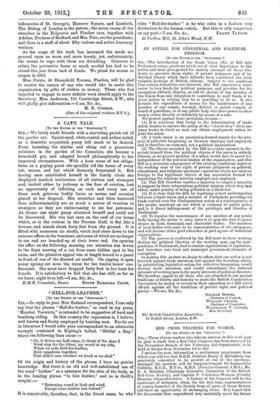AN APPEAL FOR INDUSTRIAL AND POLITICAL FREEDOM.
[To TIIE EDITOR Or THR " SPECTATOR."] SIR,—The introduction of the Trade Union (No. 2) Bill into Parliament raises questions which are of vital importance to the nation and must give ground for anxiety amongst all those who desire to preserve those rights of private judgment and of in- dividual liberty which have hitherto been considered the most valuable heritage of British citizens. Subject to the condition that certain formalities are observed, this Bill empowers a trade union to levy funds for political purposes, and provides for the exemption (entirely illusory, as will be shown) of any member of the Union from any obligation to contribute to such funds if ho gives notice in writing that he is unwilling to do so. It also permits the expenditure of money for the maintenance of any member of any county, borough, district, or parish council, or board of guardians, or of any public body who have power to raise money either directly or indirectly by means of a rate.
We protest against these provisions, because—
(1) It is notorious that owing to the determination of trade union leaders to enforce the policy of the " closed shop" there are many trades in which no man can obtain employment unless he joins the union.
(2) A trade union is an association formed mainly for the pur- pose of collective bargaining as between employer and employed, and is therefore an economic, not a political organization.
(3) The liberty accorded by the Bill to a trade unionist to dis- sociate himself from the political objects of the union is entirely illusory, as no private member of a union would dare to assert his independence of the political leaders of the organization ; and this Bill as a necessary consequence of the existing conditions deprives the working man of the right of private judgment on political, educational, and religious questions—questions which are entirely foreign to the legitimate objects of any association formed for regulating the relations between employer and employed. (4) This Bill therefore enables a majority to compel a minority to support by their subscriptions political opinions which they may abhor, under penalty of being pilloried on a black-list.
(5) It is clear that the Bill, by legalizing a tacit understanding between a trade union and a member of Parliament providing for trade control over the Parliamentary action of a representative of the people, sanctions an act which is contrary to public policy and is a direct infringement of the privileges and liberties of Parliament.
(6) To legalize the maintenance of any member of any public body having the power to raise rates is to open the door to grave abuses in local, municipal, and charitable bodies. The members of local bodies will cease to be representatives of the ratepayers, and will become either paid advocates or paid agents of industrial organizations. (7) The powers so conferred by the Bill must in their working destroy the political liberties of the working man, sap the inde- pendence of Parliament, lead to similar organizations of capitalists, and introduce into local and municipal government elements of corruption. In making this protest we desire to affirm that our action is not directed against trade unionism, but against the Socialism which, by substituting legislative action for collective bargaining, would destroy trade unionism, and would subordinate the material interests of working men to the party interests of political theorists. We therefore appeal to all those who are attached to our ancient traditions of liberty and honesty to assist the British Constitution Association by money or service in their opposition to a Bill which offends against all the traditions of private right and political purity.—We are, Sir, &c., The British Constitution Association, 11 Tothill Street, London, S.W.
GRAHAM BOWER,
Chairman of Council.
WILLIAM CHANCE, Chairman of Committee.
WILBRAHAM V. COOPER, Hon. Secretary.


















































 Previous page
Previous page